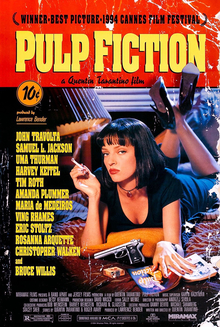Pulp Fiction
Pulp Fiction is a 1994 American crime film written and directed by Quentin Tarantino. The film is known for its eclectic dialogue, ironic mix of humor and violence, nonlinear storyline, and a host of cinematic allusions and pop culture references. It features an ensemble cast including John Travolta, Samuel L. Jackson, Uma Thurman, Harvey Keitel, Tim Roth, Amanda Plummer, Maria de Medeiros, Ving Rhames, and Bruce Willis.
Plot[edit | edit source]
The film's narrative is told out of chronological order and follows three main interrelated stories: the lives of two mob hitmen, a boxer, a gangster's wife, and a pair of diner bandits. These stories are:
- Vincent Vega and Marsellus Wallace's Wife: Vincent Vega (John Travolta) is a hitman who is ordered by his boss, Marsellus Wallace (Ving Rhames), to take his wife Mia (Uma Thurman) out for a night on the town while Wallace is away.
- The Gold Watch: Butch Coolidge (Bruce Willis) is an aging boxer who is paid by Wallace to lose a fight. Instead, he double-crosses Wallace and tries to escape with his girlfriend.
- The Bonnie Situation: Jules Winnfield (Samuel L. Jackson) and Vincent Vega are hitmen who experience a series of mishaps after a job goes wrong, leading them to seek help from Winston Wolf (Harvey Keitel).
Cast[edit | edit source]
- John Travolta as Vincent Vega
- Samuel L. Jackson as Jules Winnfield
- Uma Thurman as Mia Wallace
- Bruce Willis as Butch Coolidge
- Ving Rhames as Marsellus Wallace
- Harvey Keitel as Winston Wolf
- Tim Roth as Pumpkin
- Amanda Plummer as Honey Bunny
- Maria de Medeiros as Fabienne
Production[edit | edit source]
Pulp Fiction was produced by Lawrence Bender and the screenplay was written by Quentin Tarantino and Roger Avary. The film's development began in 1992, and it was shot over a period of several months in 1993. The film's distinctive style and structure have been widely imitated and parodied.
Reception[edit | edit source]
Pulp Fiction premiered at the Cannes Film Festival in 1994, where it won the Palme d'Or. It was a major critical and commercial success, grossing over $213 million worldwide. The film received seven Academy Award nominations, including Best Picture, and won the award for Best Original Screenplay.
Legacy[edit | edit source]
Pulp Fiction is considered one of the greatest films ever made. It has been credited with revitalizing the career of John Travolta, who received an Academy Award nomination for his role. The film's success also cemented Quentin Tarantino's status as one of the most influential filmmakers of his generation.
Related Pages[edit | edit source]
- Quentin Tarantino
- John Travolta
- Samuel L. Jackson
- Uma Thurman
- Bruce Willis
- Crime film
- Cannes Film Festival
- Academy Awards
Categories[edit | edit source]
| Quentin Tarantino | ||||||||||
|---|---|---|---|---|---|---|---|---|---|---|
|
Search WikiMD
Ad.Tired of being Overweight? Try W8MD's NYC physician weight loss.
Semaglutide (Ozempic / Wegovy and Tirzepatide (Mounjaro / Zepbound) available. Call 718 946 5500.
Advertise on WikiMD
|
WikiMD's Wellness Encyclopedia |
| Let Food Be Thy Medicine Medicine Thy Food - Hippocrates |
Translate this page: - East Asian
中文,
日本,
한국어,
South Asian
हिन्दी,
தமிழ்,
తెలుగు,
Urdu,
ಕನ್ನಡ,
Southeast Asian
Indonesian,
Vietnamese,
Thai,
မြန်မာဘာသာ,
বাংলা
European
español,
Deutsch,
français,
Greek,
português do Brasil,
polski,
română,
русский,
Nederlands,
norsk,
svenska,
suomi,
Italian
Middle Eastern & African
عربى,
Turkish,
Persian,
Hebrew,
Afrikaans,
isiZulu,
Kiswahili,
Other
Bulgarian,
Hungarian,
Czech,
Swedish,
മലയാളം,
मराठी,
ਪੰਜਾਬੀ,
ગુજરાતી,
Portuguese,
Ukrainian
Medical Disclaimer: WikiMD is not a substitute for professional medical advice. The information on WikiMD is provided as an information resource only, may be incorrect, outdated or misleading, and is not to be used or relied on for any diagnostic or treatment purposes. Please consult your health care provider before making any healthcare decisions or for guidance about a specific medical condition. WikiMD expressly disclaims responsibility, and shall have no liability, for any damages, loss, injury, or liability whatsoever suffered as a result of your reliance on the information contained in this site. By visiting this site you agree to the foregoing terms and conditions, which may from time to time be changed or supplemented by WikiMD. If you do not agree to the foregoing terms and conditions, you should not enter or use this site. See full disclaimer.
Credits:Most images are courtesy of Wikimedia commons, and templates, categories Wikipedia, licensed under CC BY SA or similar.
Contributors: Prab R. Tumpati, MD

